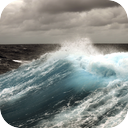(short preview of full seamless looping track)
Windy Sea
This product is not available in the selected currency.
In Stock
Backordered
Out of Stock
Description
The quiet of a bright blue sky swiftly turns into the terror of a dark ocean erupting in a rage of towering waves that rise into the air like mountains. Blocking out the horizon and ending any hope of having an easy ride across the water today, you scramble for cover inside the boat's cabin and pray that the God of the sea has mercy on your tiny vessel. Historically, the Beaufort wind force scale provides an empirical description of wind speed based on observed sea conditions. Originally it was a 13-level scale, but during the 1940s, the scale was expanded to 17 levels. There are general terms that differentiate winds of different average speeds such as a breeze, a gale, a storm, tornado, or a hurricane. Within the Beaufort scale, gale-force winds lie between 28 knots (52 km/h) and 55 knots (102 km/h) with preceding adjectives such as moderate, fresh, strong, and whole used to differentiate the wind's strength within the gale category. A storm has winds of 56 knots (104 km/h) to 63 knots (117 km/h). The terminology for tropical cyclones differs from one region to another globally. Most ocean basins use the average wind speed to determine the tropical cyclone's category. As a natural force, the wind was often personified as one or more wind gods or as an expression of the supernatural in many cultures. Vayu is the Hindu God of Wind. The Greek wind gods include Boreas, Notus, Eurus, and Zephyrus. Aeolus, in varying interpretations the ruler or keeper of the four winds, has also been described as Astraeus, the god of dusk who fathered the four winds with Eos, goddess of dawn. The Ancient Greeks also observed the seasonal change of the winds, as evidenced by the Tower of the Winds in Athens.
This sound uses the following file from Freesound: http://www.freesound.org/people/inchadney/sounds/127390/
Opps
Sorry, it looks like some products are not available in selected quantity.



